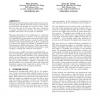Free Online Productivity Tools
i2Speak
i2Symbol
i2OCR
iTex2Img
iWeb2Print
iWeb2Shot
i2Type
iPdf2Split
iPdf2Merge
i2Bopomofo
i2Arabic
i2Style
i2Image
i2PDF
iLatex2Rtf
Sci2ools
120
click to vote
ASPLOS
2000
ACM
2000
ACM
Symbiotic Jobscheduling for a Simultaneous Multithreading Processor
Simultaneous Multithreading machines fetch and execute instructions from multiple instruction streams to increase system utilization and speedup the execution of jobs. When there are more jobs in the system than there is hardware to support simultaneous execution, the operating system scheduler must choose the set of jobs to coschedule This paper demonstrates that performance on a hardware multithreaded processor is sensitive to the set of jobs that are coscheduled bythe operating systemjobscheduler. Thus, the full bene ts of SMT hardware can only be achieved if the scheduler is aware of thread interactions. Here, a mechanism is presented that allows the scheduler to signi cantly raise the performance of SMT architectures. This is done without any advance knowledge of a workload's characteristics, using sampling to identify jobs which run well together. We demonstrate an SMT jobscheduler called SOS. SOS combines an overhead-free sample phase which collects information about vario...
ASPLOS 2000 | Hardware Multithreaded Processor | Multiple Instruction Streams | Programming Languages | Simultaneous Multithreading Machines |
| Added | 01 Aug 2010 |
| Updated | 01 Aug 2010 |
| Type | Conference |
| Year | 2000 |
| Where | ASPLOS |
| Authors | Allan Snavely, Dean M. Tullsen |
Comments (0)

